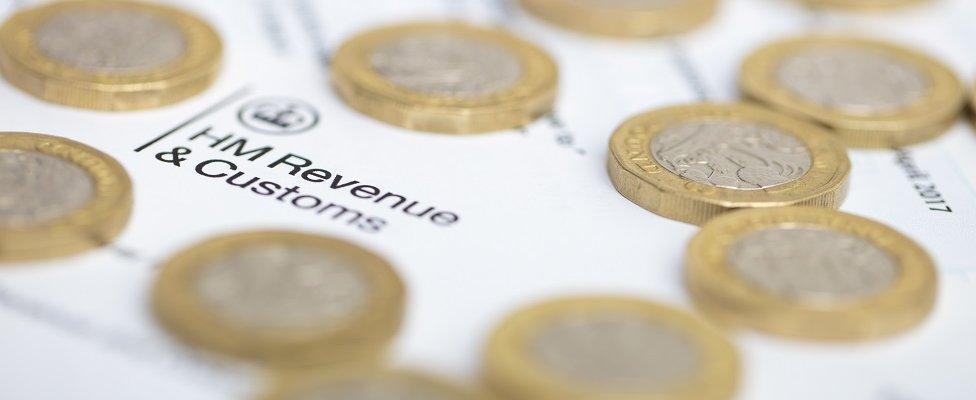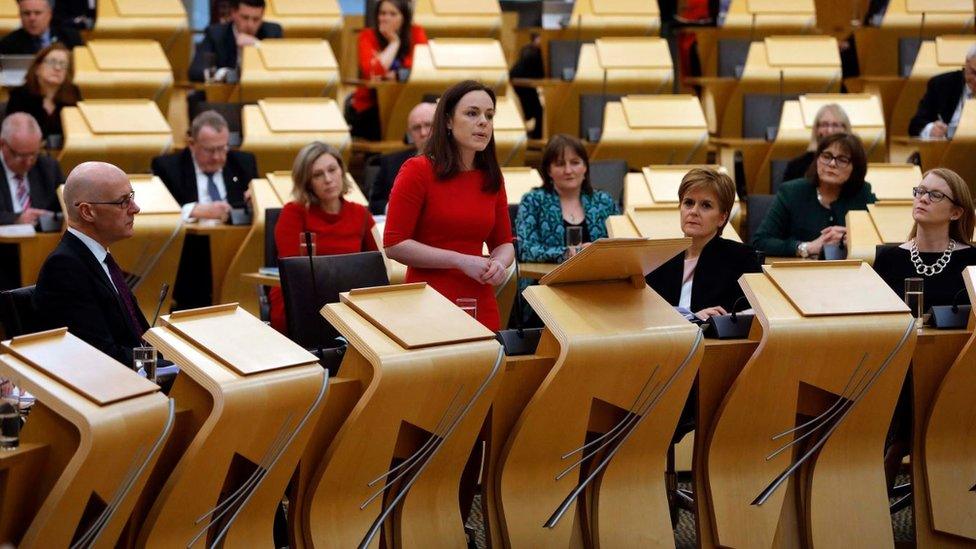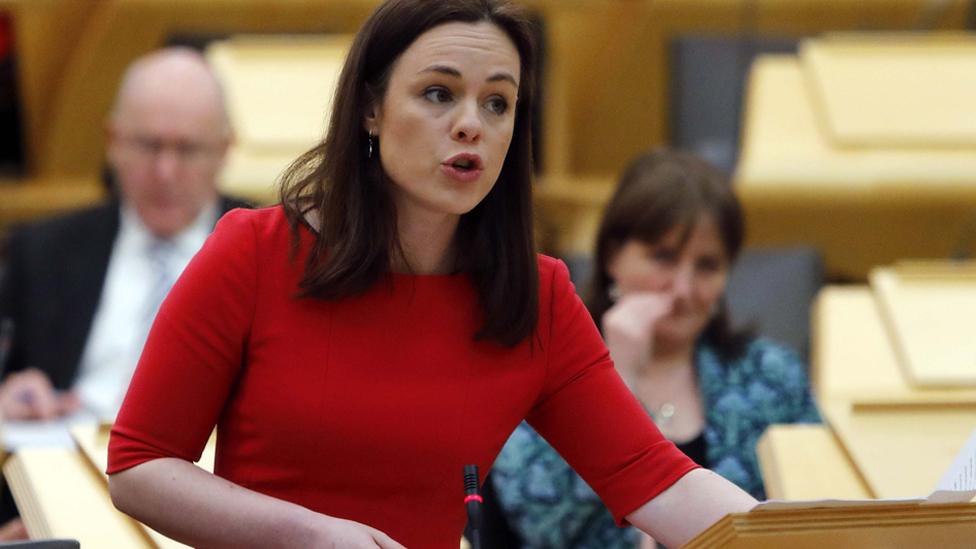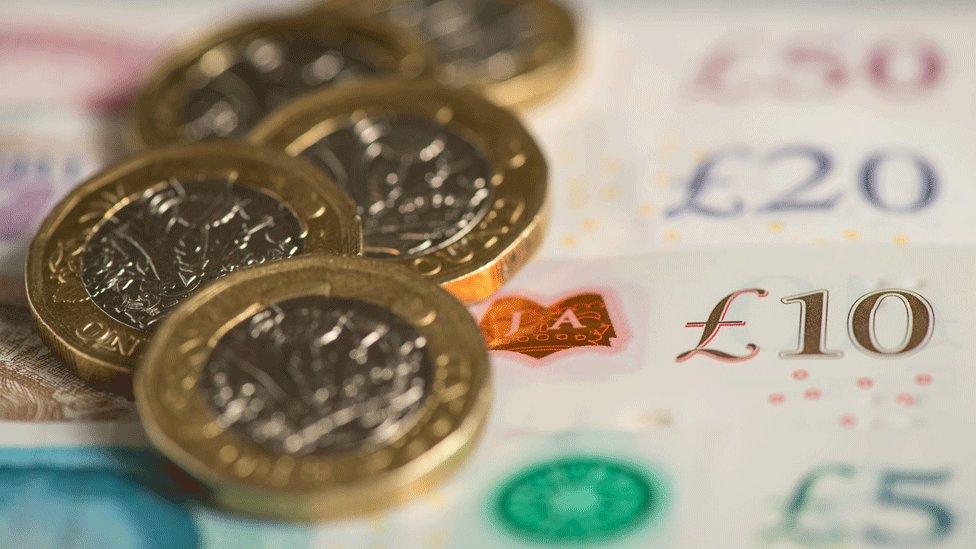Scottish income tax 2020/21 - How it compares to rest of UK
- Published

The Scottish government has announced in its draft budget that income tax rates north of the border will not change in 2020/21. But that is not the complete financial picture. Unusually the budget statement at Holyrood comes ahead of the Chancellor's UK address to the Commons on 11 March.
So, based on a part picture - one which does not include possible changes to the personal allowance - tax consultant Deloitte has put together examples spanning different salaries.
The lower earner
£15,000 salary
If you earn a salary of £15,000 in 2020/21 and have no other income, the personal allowance of £12,500 (assuming this is not altered in the UK Budget ) will be deducted and £2,500 will be taxable.
If you are resident in Scotland, your income tax calculation will be as follows;
Scottish starter rate - £2,085 at 19%= £396.15
Scottish basic rate - £415 at 20% = £83
Total tax = £479.15
This is a decrease of 36p compared to 2019/20 due to the increase in the starter band from £2,049 to £2,085.
If you earned the same sum of money but were not resident in Scotland the full £2,500 would be taxable at 20% (UK basic rate) producing an income tax bill of £500. Therefore, you would pay £20.85 less as a resident of Scotland.
The medium to higher earners
£33,000 salary
If you earn a salary of £33,000 in 2020/21 and have no other income, the personal allowance of £12,500 will be deducted and £20,500 will be taxable. If you are resident in Scotland, your income tax will be as follows:
Scottish starter rate - £2,085 at 19% = £396.15
Scottish basic rate - £10,573 at 20% = £ 2,114.60
Scottish intermediate rate - £7,842 at 21% = £1,646.82
Tax total = £4,157.57
This is a decrease of £2.50 compared to 2019/20 due to the small inflationary increases in the starter and basic rate band which reduces the amount paid at intermediate rate
If you were resident elsewhere in the UK, the full £20,500 would be taxable at 20% (UK basic rate), giving an income tax liability of £4,100. A Scottish resident would pay an additional £57.57 in income tax compared with living elsewhere in the UK.
£50,000 salary
If you earn a salary of £50,000 in 2020/21 and have no other income £37,500 will be taxable after deduction of the £12,500 personal allowance.
If you are resident in Scotland, the tax calculation will be as follows;
Scottish starter rate - £2,085 at 19% = £396.15
Scottish basic rate - £10,573 at 20% = £ 2,114.60
Scottish intermediate rate - £18,272 at 21% =£3,837.12
Scottish higher rate - £6,570 at 41%= £2,693.70
Total tax = £9,041.57
This is a decrease of £2.50 compared to 2019/20 due to the small inflationary increases in the starter and basic rate and the reduction in the intermediate rate band.
If you were not resident in Scotland, the full £37,500 would be taxable at 20% (UK basic rate) producing an income tax bill of £7,500. You would therefore be paying £1,541.57 more in tax as a resident of Scotland.
The higher earner
£200,000 salary
If you earn a salary of £200,000 in 2020/21 and have no other income you are not entitled to a personal allowance because your income exceeds £125,000. The taxable income is therefore £200,000.
If you are a resident in Scotland, your income tax break down is as follows:
Scottish starter rate - £2,085 at 19% = £396.15
Scottish basic rate - £10,573 at 20% = £ 2,114.60
Scottish intermediate rate - £18,272 at 21% =£3,837.12
Scottish higher rate - £119,070 at 41% = £48,818.70
Scottish additional rate - £50,000 at 46% = £23,000
Total tax = £78,166.57
This is a decrease of £2.50 compared to 2019/20 due to small increases in the starter and basic rate bands combined with a reduction in the intermediate rate band.
If you are a resident elsewhere in the UK, on this salary you would pay £75,000 in tax - £3,166.57 less than north of the border.

Scottish income tax analysis - 'Modest savings'
John Macintosh, Tax Partner at Deloitte, external, said: "This is an unusual budget on many levels, not least that the Scottish government has been required to set out its plans for the year ahead without knowing the full tax and spending breakdown from the UK government.
"As expected, the Scottish government announced there will be no change to income tax rates, with basic and intermediate thresholds increasing at the same rate as inflation, while higher and top thresholds will be frozen.
"Based on the changes announced, there are modest tax savings for all Scottish taxpayers, as the starter and basic rate bands have increased by CPI inflation while the intermediate band has shrunk so that the Scottish higher rate threshold remains at £43,430 and the Scottish additional rate threshold at £150,000.
"However, the overall position does depend on any changes to the personal allowance and tax rates and bands made in the UK budget on 11 March. The Scottish Budget assumes that these will remain unchanged.
"Lower earners continue to pay less tax than those in the rest of the UK; in 2019/20 the breakeven earnings were £26,993. The equivalent for 2020/21 is £27,243.
"All earners will see another saving from the UK-wide increase in the National Insurance threshold from £8,632 to £9,500 annually (with equivalent figures for those paid weekly or monthly). This will give an NIC saving of up to £104.16 pa for employees and £78.12 for the self-employed; those earning more than £9,500 will see the full savings.
"This also means there will be no further income tax divergence between Scotland and the rest of the UK. However, this is based on the assumption that UK personal allowance and higher rate tax will not change, so there remains an element of uncertainty for Scottish taxpayers until the UK government gives its full fiscal statement on 11 March."
- Published3 February 2020

- Published6 February 2020

- Published7 December 2021
